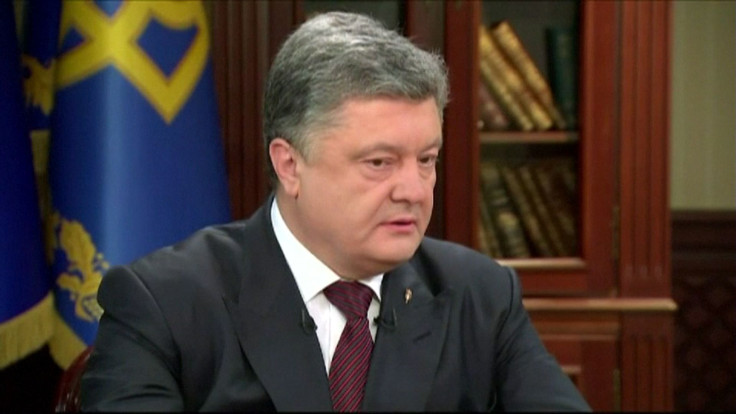Ukraine's Poroshenko Urges Parliament To Vote In New Prime Minister [Video]

Ukrainian President Petro Poroshenko called on Monday (April 11) for members of parliament to swiftly create a new coalition and vote in a new prime minister after incumbent Arseny Yatseniuk tendered his resignation on Sunday (April 10).
Yatseniuk's decision has paved the way for Western-backed coalition parties to nominate an ally of President Petro Poroshenko to try to form a more stable government.
"I am sure that on Tuesday (April 12) we must have a coalition. And I must have offered the candidate for prime minister. I expect it will be Groysman. I am not going to give up this idea. But I will work with any prime minister," said Poroshenko.
Yatseniuk survived a no-confidence motion in February, but political infighting and graft scandals have fractured the ruling coalition and further delayed the disbursement of aid under a $17.5 billion International Monetary Fund bailout programme.
The self-described "kamikaze" prime minister came to office in 2014 determined to pass stringent economic reforms, but his public support has slumped into the low single digits, partly on the perception that his government has not done enough to hold oligarchs to account.
His departure removes an obstacle to the formation of a new government, which must try to push delayed reform bills through parliament against the opposition of populist former coalition partners who have vowed to oppose austerity measures required under the IMF programme.
Poroshenko's BPP faction and Yatseniuk's People's Front party had been expected to announce a reboot of their ruling coalition next week.
"At the moment I do not see dignified (candidates) to hold this position because Ukraine is at the stage when there is no clear leader. In this situation I do not know what would be better. But I believe Groysman is not the best candidature at the moment. He is not a leader, that's it," said Kiev resident Oksana.
"Groysman does not fit. He could not string two words together in the Verkhovna Rada (Ukrainian parliament) when he was in the Verkhovna Rada," said Kiev resident Anatoliy.
"I believe that the president and prime minister must work together - be in the same coalition or something. That is why the candidate offered by the president will be better than one who would not cooperate with the president," said Kiev resident Evgeniy.
In his speech, Yatseniuk said his party was committed to the coalition and made clear that he expected to be replaced by parliamentary speaker Volodymyr Groysman, the 38-year-old former mayor of a town in west-central Ukraine already touted as his successor.
A complete break-up of the coalition could have triggered a snap parliamentary election that looked likely to boost populist parties. Meanwhile, if Groysman secures parliamentary approval, the formation of a more coherent government should increase the chance that the IMF will disburse the next $1.7 billion tranche of loans, delayed since October.
"In case of the creation of a Groysman government, as you said - please write it down and hold me to it later - this government will be public, open, effective, reformist," said Groysman.
Nevertheless some domestic reformers and Western powers backing Ukraine may be disappointed by Groysman's likely appointment, having hoped that Finance Minister Natalia Yaresko, a U.S.-born technocrat, would get the top job.
Having an ally as prime minister could consolidate power in the hands of the president and his circle.
It was frustration with cronyism and corruption under Russian-backed president Viktor Yanukovich that prompted thousands to take to the streets in 2013-14 in the pro-European "Maidan" uprising that swept Kiev's current leadership to power.
Groysman is seen as a canny, persuasive politician who has grown in confidence as speaker of parliament - a role that requires a calm authority to manage the bickering and all-out brawls that periodically interrupt sessions in Ukraine's chamber.
He has vowed to stick to IMF-backed reform efforts as prime minister, but the two-party coalition will only have a slender majority and some of its lawmakers have said they will not always vote on party lines.
© Copyright Thomson Reuters 2024. All rights reserved.











